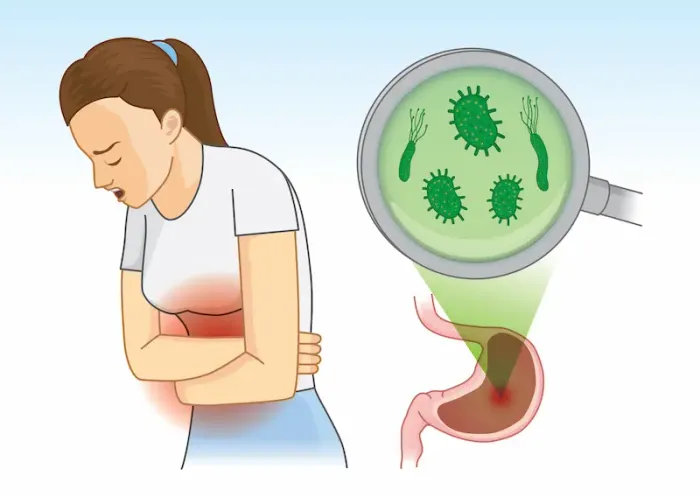H. Pylori Overview of Symptoms and Treatment
H. pylori infection can cause stomach pain, ulcers, and digestive issues. Learn about common symptoms, diagnosis methods, and effective treatment options to eradicate this bacterial infection.


If you’ve been experiencing frequent stomach pain, bloating, or indigestion, you might have heard about H. pylori (Helicobacter pylori). This tiny bacterium is a common cause of stomach infections and can lead to ulcers and other digestive issues. The good news is that with the right diagnosis and treatment, it can be managed effectively.
Let’s understand what H. pylori is, its symptoms, causes, and how you can treat and prevent it.
What is H. Pylori?
H. pylori is a type of bacteria that infects the stomach lining. It weakens the protective mucus layer, allowing stomach acid to damage the lining, leading to ulcers (sores in the stomach or small intestine). While many people with H. pylori don’t show symptoms, it can cause serious problems if left untreated.
Common Symptoms of H. Pylori Infection
Not everyone with H. pylori experiences symptoms, but when they do, they may include:
• Burning stomach pain (especially when the stomach is empty)
• Bloating or frequent burping
• Nausea or vomiting
• Loss of appetite
• Unexplained weight loss
• Dark or bloody stools (a sign of bleeding ulcers)
• Fatigue (due to anaemia from internal bleeding)
If you notice these symptoms persistently, it’s best to consult a doctor.
Consult Top Specialists
How Do You Get H. Pylori?
The exact way H. pylori spreads isn’t fully understood, but possible causes include:
• Contaminated food or water (common in areas with poor sanitation)
• Close contact with an infected person (through saliva or stool)
• Living in crowded or unsanitary conditions
It’s more common in developing countries but can affect anyone.
How Does H. Pylori Affect Your Health?
If untreated, H. pylori can lead to:
• Stomach ulcers (painful sores in the stomach or intestine)
• Gastritis (inflammation of the stomach lining)
• Stomach cancer (in rare cases, long-term infection increases risk)
Early detection and treatment can prevent complications.
Diagnosis: How is H. Pylori Detected?
Doctors use different tests to confirm an H. pylori infection:
1. Breath Test: You drink a special liquid and blow into a bag to check for bacteria.
2. Stool Test: A sample is tested for H. pylori bacteria.
3. Blood Test: Checks for antibodies, but can’t tell if it’s a current or past infection.
4. Endoscopy: A thin tube with a camera examines the stomach (used if symptoms are severe).
If you suspect an infection, you can book a test easily through Apollo 24|7 for quick and accurate results.
Treatment for H. Pylori
H. pylori is treated with a combination of antibiotics and acid-reducing medicines. A typical treatment plan includes:
• Two antibiotics (to kill the bacteria)
• Proton pump inhibitors (PPIs) (to reduce stomach acid and help healing)
• Bismuth subsalicylate (sometimes added to protect the stomach lining)
It’s important to complete the full course of antibiotics even if symptoms improve, to prevent the bacteria from coming back.
Lifestyle and Diet Tips for Managing H. Pylori
While medicines are essential, certain lifestyle changes can help recovery and prevent reinfection:
Dietary Changes:
• Eat probiotic-rich foods (yoghurt, kefir, kimchi): Helps restore good gut bacteria.
• Avoid spicy, acidic, or fried foods: These can irritate the stomach.
• Limit caffeine and alcohol: They increase stomach acid.
• Eat smaller, frequent meals: Reduces acid buildup.
Hygiene Practices:
• Wash hands before eating and after using the bathroom: Prevents spread.
• Drink clean, filtered water: Avoid contaminated sources.
• Avoid sharing utensils or food with infected individuals.
When to See a Doctor?
Consult a doctor if you have:
• Severe or persistent stomach pain
• Difficulty swallowing
• Unexplained weight loss
• Blood in vomit or stool
Early treatment prevents complications. You can schedule a consultation with a gastroenterologist through Apollo 24|7 for expert advice.
Conclusion
H. pylori is a common but treatable infection. If you experience ongoing stomach discomfort, don’t ignore it—get tested and follow your doctor’s advice. With proper medication and healthy habits, you can recover fully and protect your digestive health.
Need help? Book a consultation or lab test with Apollo 24|7 today for expert care.
Consult Top Specialists
Consult Top Specialists

Dr. Chethan T L
General Physician/ Internal Medicine Specialist
5 Years • MBBS, MD, DNB (General Medicine)
Bengaluru
Apollo Medical Center, Marathahalli, Bengaluru

Dr Harish K C
Gastroenterology/gi Medicine Specialist
15 Years • MBBS MD DM MRCP(UK) (SCE-Gastroenterology and Hepatology)
Bengaluru
Apollo Clinic, JP nagar, Bengaluru

Dr Anshuman Kaushal
Minimal Access/Surgical Gastroenterology
24 Years • MS FNB (MAS) FACS FCLS FIAGES FALS (BARIATRIC) FMAS
Delhi
Apollo Hospitals Indraprastha, Delhi

Dr. Arun N
Gastroenterology/gi Medicine Specialist
17 Years • MBBS, DNB PED , DM GASTRO
Chennai
Apollo Hospitals Greams Road, Chennai
(700+ Patients)

Dr. Jatin Yegurla
Gastroenterology/gi Medicine Specialist
11 Years • MD (PGI), DM (AIIMS Delhi), FAGIE (AIIMS Delhi), ESEGH (UK), Gold Medalist
Hyderabad
Apollo Hospitals Jubilee Hills, Hyderabad
(625+ Patients)
Consult Top Specialists

Dr. Chethan T L
General Physician/ Internal Medicine Specialist
5 Years • MBBS, MD, DNB (General Medicine)
Bengaluru
Apollo Medical Center, Marathahalli, Bengaluru

Dr Harish K C
Gastroenterology/gi Medicine Specialist
15 Years • MBBS MD DM MRCP(UK) (SCE-Gastroenterology and Hepatology)
Bengaluru
Apollo Clinic, JP nagar, Bengaluru

Dr Anshuman Kaushal
Minimal Access/Surgical Gastroenterology
24 Years • MS FNB (MAS) FACS FCLS FIAGES FALS (BARIATRIC) FMAS
Delhi
Apollo Hospitals Indraprastha, Delhi

Dr. Arun N
Gastroenterology/gi Medicine Specialist
17 Years • MBBS, DNB PED , DM GASTRO
Chennai
Apollo Hospitals Greams Road, Chennai
(700+ Patients)

Dr. Jatin Yegurla
Gastroenterology/gi Medicine Specialist
11 Years • MD (PGI), DM (AIIMS Delhi), FAGIE (AIIMS Delhi), ESEGH (UK), Gold Medalist
Hyderabad
Apollo Hospitals Jubilee Hills, Hyderabad
(625+ Patients)

.jpeg)


